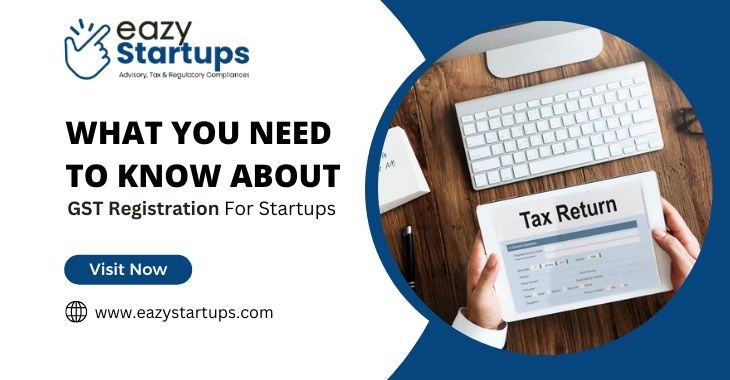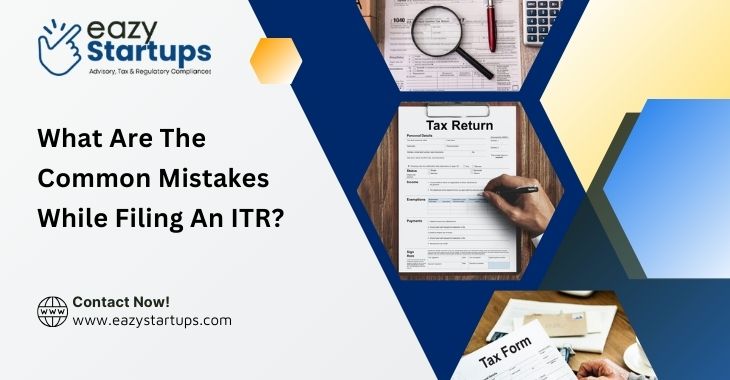It can be difficult to file income tax returns, particularly if you are unfamiliar with tax laws and regulations. But, you may streamline the procedure and guarantee that your taxes are filed on time and accurately by avoiding frequent blunders. Here are nine typical errors to avoid when making a perfect income tax return. If you opt for Online Income Tax Filing or Online Income Tax Registration, contact Eazy Startups.
Let’s get into the discussion:–
1. Procrastination
2. Inaccurate Personal Data
3. Neglecting to Report All Income
4. Neglecting Credits and Deductions
5. Filing the Wrong Tax Form
6. Mathematical Errors
7. Forgetting to Sign Your Return
8. Ignoring State Tax Obligations
9. Failing to Keep Proper Records
Procrastination:
Waiting until the last minute to submit your taxes is one of the greatest blunders you can make. Delays can result in mistakes, overlooked deductions, and needless stress. Assemble your paperwork as soon as possible to give yourself enough time to accurately finish your return.
Inaccurate Personal Data:
Small mistakes, such as misspelling your name, entering the wrong Social Security number, or providing the wrong bank account number, can seriously delay the processing of your return. To prevent these problems, double-check your personal information before filing your tax return.
Neglecting to Report All Income:
Reporting requirements apply to all forms of income, including salaries, freelancing earnings, interest, dividends, and rental revenue. Interest and penalties may apply if not all revenue is reported. Before submitting your return, ensure you have all your W-2s, 1099s, and other income statements.
Neglecting Credits and Deductions:
Tax deductions and credits can greatly decrease your tax payment. Interest paid on school loans, mortgage, and charity contributions are common deductions. You can also obtain significant savings via credits like the Child Tax Credit and the Earned Income Tax Credit (EITC). To optimize your return, find and submit claims for any credits and deductions that you are eligible for.
Filing the Wrong Tax Form:
Using the wrong tax form might cause issues and delays. The IRS provides a variety of forms, such as 1040, 1040A, and 1040EZ, each intended for a particular filing scenario. Make sure the form you select is appropriate for your particular situation. When in doubt, get advice from a tax expert or utilize process-guiding tax software.
Mathematical Errors:
Common mistakes in math can lead to inaccurate tax calculations. These mistakes may result in an IRS audit as well as delays in the processing of your return. To reduce the possibility of mathematical errors, use tax software, or double-check your numbers if you’re filing by hand.
Forgetting to Sign Your Return:
The IRS considers a tax return that is not signed to be invalid. Both you and your spouse must sign the return if you’re filing jointly. The processing of your refund may be delayed if you forget to sign your return. To guarantee that your return is accepted if you’re filing electronically, follow the e-signature guidelines.
Ignoring State Tax Obligations:
State and federal tax laws might be very different. Remember that not filing state taxes can result in penalties and interest, so don’t ignore them. Ensure you are aware of the filing procedures in your state and file both your state and federal returns simultaneously.
Failing to Keep Proper Records:
Accurate tax filing requires proper record-keeping. Throughout the year, keep neat records of your earnings, outlays, receipts, and other pertinent paperwork. This procedure facilitates the completion of your return and offers the required supporting paperwork in the event of an audit.
Conclusion
A faultless income tax file can be ensured by avoiding these typical errors. Make sure to start early, verify your information, declare all of your income, and utilize all of the available credits and deductions. Sign your return, use the right forms, and avoid math mistakes. Remember to file state taxes on time and maintain accurate documentation. If you’re unsure about any aspect of your tax return, consider consulting a tax professional for guidance. If you opt for Online Income Tax Filing or Online Income Tax Registration, contact Eazy Startups.











Recent Comments